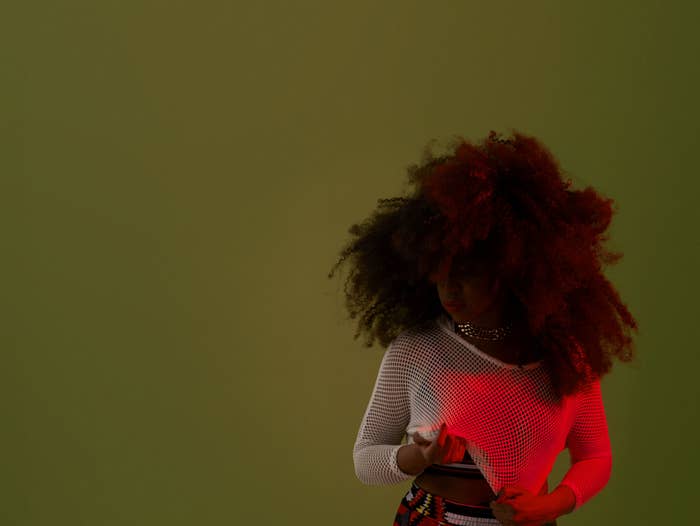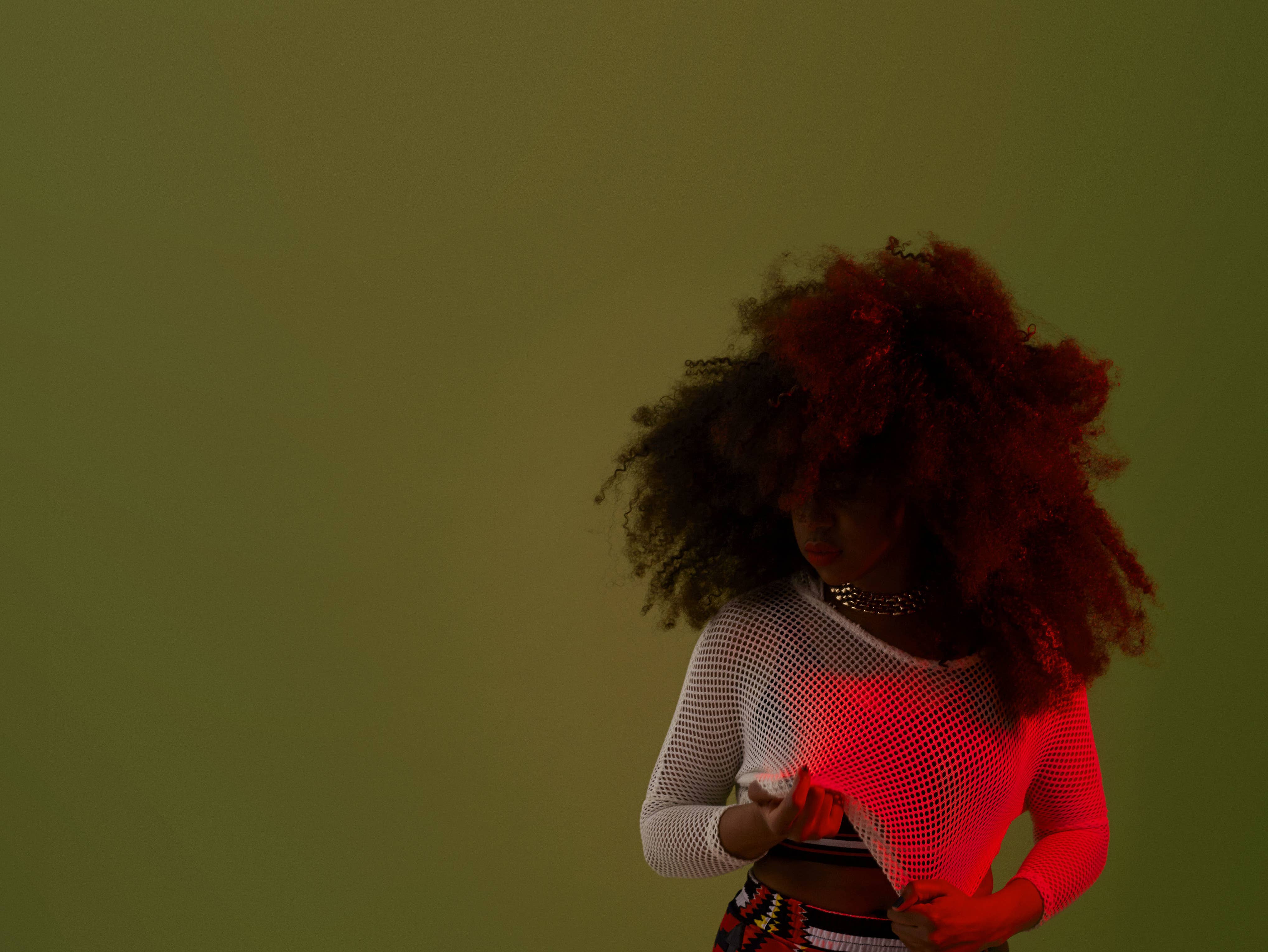
Taking a short break from the day's recording session, electronic-funk-soul singer and producer NAO steps out from her studio in Stoke Newington. Jamming with self-scouted talent Mauimush, Nao Jessica Joshua is buzzing off the 18-year-old's distinct vocals. "I hope to sign him to my record label, Little Tokyo Recordings," she gushes. "He's super young, but he already has his own sound. Today is all about trying out production ideas, and he knows what he likes." Approaching her A&R work with the same laid-back attitude she fronts via her own eponymous music project, NAO is the 28-year-old East London native picking up significant momentum right now.
Best known for her epic self-written and produced song "Fool To Love", the soulful lullaby is currently sitting on close to a million spins online. Previously a backing vocalist—following her debut in 2014 EP with So Good, NAO's second project, II MMXV, was applauded across the board and subsequently secured her a nomination for Best Newcomer at the 2015 MOBO Awards. She also landed third place in the BBC Sound Of 2016 hotlist, and songs like "Bad Blood", "Girlfriend", and perhaps her most poignant, poweful and spine-tingling song to date, "In The Morning", have all been playlisted by trend-defining music platforms and radio shows. NAO also featured on Disclosure's wompy anthem, "Super Ego", and her collaboration with Mura Masa, "Firefly", enjoyed the number one spot on Spotify's chart.
Releasing her much-hyped debut album, For All We Know, earlier this month, featuring collaborations with Jai Paul, Jungle and Royce Wood Junior, NAO's addition to 2016's already impressive roster of outstanding new talent is so much stronger because of her. Poetic, honest and relatable, her vocals resonate with pain and lustful desire from track to track; unique in her ability to marry ambient electronics with siren-like writing, a sea of uneasiness churns with energetic force throughout the LP.
Complex caught up with the delectable, dark fro'd beauty to discuss how she keeps her vision focused and her work ethic so meticulous.
Are you quite an improv. recording artist?
It depends on what stage of the song I'm working on. When it's the beginning of a project and you have nothing to work on, I like jamming with my friends, getting on the bass guitar and seeing what happens. After that, when you have the core idea down, you need to start planning more. I prefer to work super free. When I first start writing, it's all usually more based on a word; one word comes out and I think on how that word makes me feel and then build songs around that feeling.
Are you a naturally confident person?
I don't know. I feel like you have to have some level of confidence to get up and sing in-front of people and get your music out there. You wouldn't be able to push through otherwise. You have to convince people that you're thick-skinned, otherwise it doesn't work. But I don't want to confuse confidence with ego. I'm definitely a private person and some things I shy away from. It would be wrong for me deny my confidence.
I read in a previous interview that you've been preoccupied with the idea of perfection for some time. As a woman, I fully relate to the notion of an ideal that we chase physically and spiritually. Has making music quietened or aggravated those obsessions for you?
It's something I've been working on a lot. I appreciate that you can't control everything, and that was especially true with writing this album. You could take years to write an album—D'Angelo took 15 years! I wonder why he did that if he was saying to himself that it wasn't ready or good enough. I feel like that's a question I ask myself a lot, but all I can do is the best that I can do now. So I just thought I'd give this album my all, close the door and move on to something new so to learn and grow. I have let go of grappling with the idea of perfection. I just let things be as they are. That's why I called the album For All We Know because "For All We Know" is one of my favourite songs. I like the lyrics Tomorrow was made for some / Tomorrow may never come for all we know. I like the idea that even though it's melancholy, that even though tomorrow may never come, all we have is today. Just get on with it, basically, and be present. I also like the idea of anything being able to happen, which is a nice feeling as well.
What were the barriers to you entering the music industry before this point and were your fears recognised in any way when you were signed to a major label?
I established my own record label, Little Tokyo, before I started releasing my own material, and then I signed my own record to the label. Little Tokyo became a subsidiary which allowed me to put my music out on my own label, but I could also A&R it, which is something that a lot of artists wouldn't dabble with. When someone A&Rs your record, they essentially get to say what makes the cut on the tracklisting. When I signed my music to Little Tokyo I could figure out how the album would work, and what would appeal to people—I struck a good balance. The people I work with are super supportive of that. We disagree sometimes—I check-out ideas and people throw them back, so it's not complete harmony—but I have a lot of control over the music side of things which is the most important thing to me.
You've held back on promoting yourself as an artist, choosing instead to let your music speak to audiences as standalone material. Was this a conscious decision that you made before the music was released commercially?
At the start I didn't want to put too much of myself out there—almost to protect myself—because if people didn't like the music and they couldn't put a face to it, it would be better for me on a personal level. It also kept things more focused upon the music and less about me. In a day and age where we as artists promote ourselves on so many different platforms, there are so many ways for people to engage with you and for artists to reveal themselves; juxtapose that against me being the most private person ever and you can see why I am not going to be tweeting three times a day. I feel more genuine I if I don't post too many pictures on my own Facebook wall—that's just who I am, and I suppose that came across as mysterious or maybe cold. But I understand my fans more now, though. I understand that they want to know more about me; when the music is personal, the fans want to know the story behind the words and now I'm okay with just letting it trickle out. I don't think it will get to the stage where I'm promoting myself to the same level of fandom as Rihanna has.
What happened in the first meeting between yourself and the elusive Jungle lads?
I met them both twice. The first time, I wasn't working on my album and we met up and just jammed out. We tried something but that song didn't quite come out as strong as the next meeting. At that point, I was actually working on my album. We just found something that worked, which was "Get To Know You". It was really cool working with them; they're so talented and have such a particular sound, but they were still able to not put that signature on the record so it all still feels very me. It takes real talent to be able to let go of your own musical style and lend it to the person you're working for. That's a really great talent to have. I produced a lot of the album so it needed to remain quite linear. The idea of collaborations should be that every album out there has people collaborating on just making the sound. It shouldn't just be about who wrote on the album. Rihanna will have 18 people on just one song, with four producers. There isn't that many when I work—it's just me and whoever's in the room at that time for that song. So even though there are other people involved in the making of a track, it still comes from me in terms of production and writing. I do hope it feels linear and not too disjointed in that way. I'm sure Frank Ocean would have had collaborators, but we don't talk about that; we just talk about him and his work, which is the way it should be.
How do you work as a producer?
The whole album basically stemmed from me producing and writing the entirety of the album. I would then take it to my friends or people I've worked with before for help to sprinkle their magic on the music. Although I can produce, I'm not the shiniest producer in the world so it was good to get new ideas from people. It's definitely all me on this album but I had to open it up slightly to make the music the best I could, production-wise.
Do you think the divide between male and female acts affect the popularity of music today?
That's a hard question to answer and quantify a response. There is a divide when I think about it, though. Men dominate so many fields of music. There's the producer you work with, that's usually a man, you've got actual musicians who play in a band and that's usually male-dominated and the mix engineer will most probably be a man too. When you get your final track mastered, you're usually going to come cross a guy over a woman who renders the music so, yes, I definitely do feel the divide and that's why it was important for me to understand how I should produce myself. No one knows what I want to say better than me, so if I can work out how to produce my own sound—as well as sing it and write it—then at least all the music will entirely stem from me.

